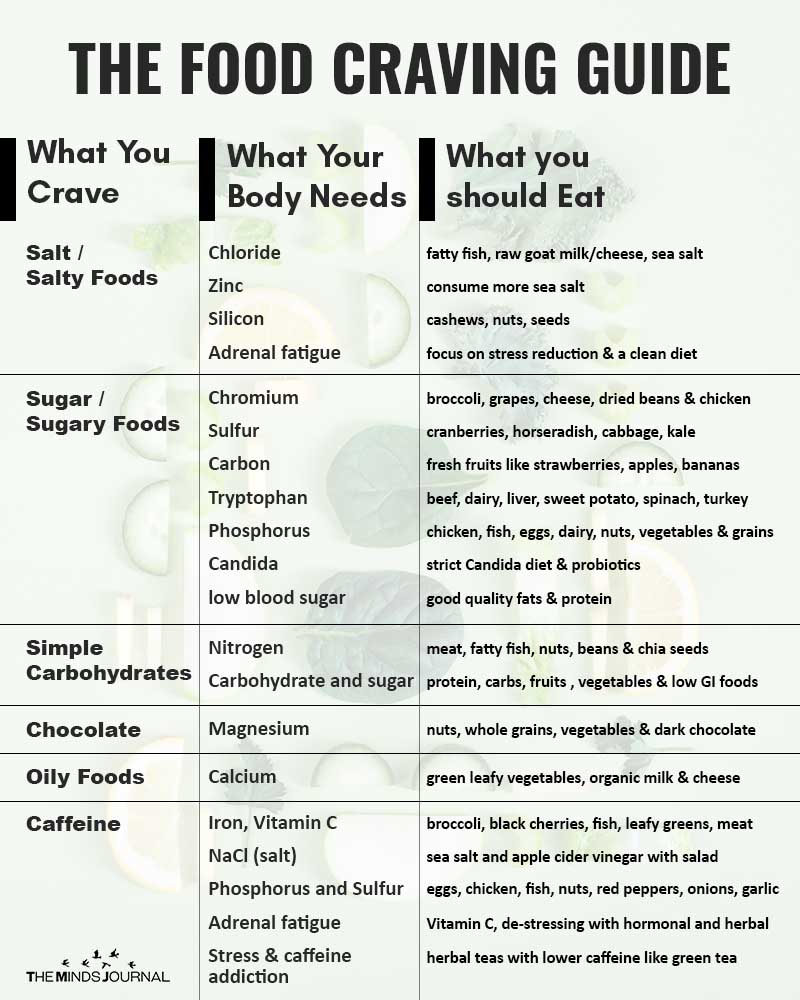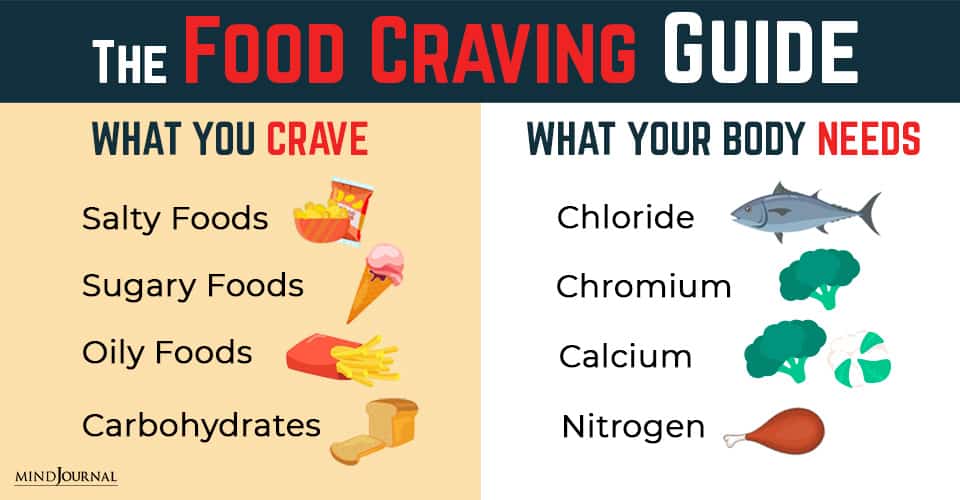It comes out of nowhere. When you least expect it. You’re minding your own business and suddenly it strikes! The food craving! It’s an intense, unshakeable feeling that grips you and strips you off any willpower.
Most of us crave for a certain type of food depending on our mood and it can be so strong that most of the time we simply cave in. I know I have almost every single time.
Yes, it feels great when I stuff my face with scrumptious chocolate cakes and delectable pastries and satiate my sweet tooth. But then comes the guilt and shame. Regardless of how hard I try, eventually I give into my cravings and start binge eating until my heart is satisfied. But why?
Why do we crave the sweetest, saltiest, fattiest, high caloric food? Is it simply a spur-of-the-moment thing? Is it due to mood swings and depression? Or is due to the type of nutrition our bodies actually need?
Instead of expressing our thoughts and emotions in a healthy manner, we shut them down by stuffing our mouths which our minds and bodies confuse as satisfying, fulfilling and comforting. Science confirms that we delve into binge eating when we are unable to express our emotions and thoughts easily or find it hard to deal with them. The less we are able to express our emotions, the unhealthy our minds, bodies and hearts become and the more food we crave.
Read Diet & Depression: 6 Ways Food Impacts Your Mental Health
What food craving actually mean
Whether you crave sugary or salty food, these are not always related to weak willpower or lack of self-control. Our gut instincts often tells us when something is wrong. However, we often tend to misinterpret the messages our instincts send us. When we are experiencing mood swings or uncontrollable emotions, we need to pause and look deeper. Most of the time our mood corresponds something going wrong at the physical level.
Our minds and bodies are perfectly synchronized and it gives us constant feedback. A physical problem can give us a hint about an emotional or mental phenomenon and vice versa. Even the most negligible change in our physical health can reveal a lot about what’s wrong with our mind, heart or soul. Food craving can be normal sometimes. But if you find yourself craving the same type of food for a long time, then it can be a warning sign for the lack of nutrition in your diet.
Our body is a complicated system of signals and balances which help it to function effectively. Food Craving is one of the many ways our physical body signals us for its requirements and asks us to fulfill that need. Cravings are often a result of hormonal imbalances, lack of specific nutrients, lifestyle changes, and behaviors. What you need to understand is what exactly your body is asking for. Once you know what it needs, then you can provide it.
Let your food craving guide you
Cravings for food provide a deeper look at our inner workings. By decoding the true meanings for your sudden cravings, you will know what is actually affecting you from inside.
Read Immunity Boosting Foods You Should Have More Often
Here we are going to take a closer look at what each type of food craving means and what you really need to eat.
Not only will you gain a better understanding of the nutrient-rich, healthy foods you need to eat instead of unhealthy, junk food, you will also be able to improve your mental, emotional and spiritual well-being by improving your physical health. Check it out below:

1. Craving: Salt/Salty Foods
A strong and frequent food craving for salty foods usually signifies a deficiency of Chloride, Zinc, Silicon and Adrenal fatigue in the body. With a proper diet you can counter such cravings and work towards building a healthier life.
What you really need to eat:
- For Chloride deficiency, eat fatty fish, raw goat milk/cheese, sea salt
- For Zinc deficiency, consume more sea salt
- For Silicon deficiency, eat cashews, nuts, seeds etc.
- For Adrenal fatigue, focus on stress reduction and a clean diet
2. Craving: Sugar/Sugary Foods
If you are addicted to sugar or constantly crave sugary foods, like me, then it means your body is experiencing a deficiency of Chromium, Sulfur, Carbon, Tryptophan, Phosphorus and Candida (yeast overgrowth in the stomach). You may also have low blood sugar due to which you feel the need to consume more sugar.
What you really need to eat:
- For Chromium deficiency, eat broccoli, grapes, cheese, dried beans and chicken
- For Sulfur deficiency, eat more cranberries, horseradish, cabbage, kale and cruciferous vegetables
- For Carbon deficiency, eat fresh fruits like strawberries, apples, bananas etc
- For Tryptophan deficiency, consume beef, cheese, dairy, liver, lamb, raisins, sweet potato, spinach, turkey
- For Phosphorus deficiency, eat chicken, beef, fatty fish, eggs, dairy, nuts, vegetables and grains
- For Candida, go for a strict Candida diet and probiotics
- For low blood sugar, eat more good quality fats and protein
3. Craving: Simple Carbohydrates
“Life is a combination of magic and pasta.” – Federico Fellini
In case you feel like binge eating on bread, pasta, starchy food, and other carbs, then it means your body lacks nitrogen, has low carbohydrate levels and is addicted to sugar. A balanced diet can help you to counter the effects and control your food craving.
Read Are You Eating Non-Stop? Here’s What You Can Do
What you really need to eat:
- For Nitrogen deficiency, eat more high protein foods like meat, fatty fish, nuts, beans and chia seeds
- For low Carbohydrate levels & sugar addiction, consume meals high in protein, complex carbs, healthy fat, low GI foods (low glycemic index) like fruits and vegetables, low-fat dairy foods and minimally processed grain
- Make sure you avoid artificial sweeteners
4. Craving: Chocolate
Although this may sound like the best food craving you can have, but the truth is an unhealthy craving for chocolates actually hints at a Magnesium deficiency in the body. It’s perfectly fine to binge eat a few chocolates every now and then, but if this is getting out of hand then you need to check your diet plans.
What you really need to eat:
- For Magnesium deficiency, eat more legumes, nuts and seeds, whole grains, leafy green vegetables and high-cocoa dark chocolate
5. Craving: Oily Foods
An unhealthy craving for oily foods like potato chips, french fries, fried chicken wings and other fried foods and fatty snacks means your body may be lacking Calcium. If you have Calcium deficiency, then you may experience frequent muscle aches, cramps and spasms
What you really need to eat:
- For Calcium deficiency, add more green leafy vegetables, organic milk and cheese to your diet
Read Why Can’t I Stop Overeating?
6. Craving: Caffeine
“Food is better medicine than drugs.” – Patrick Holford
Most of us are addicted to Caffeine in some ways. But if you simply can’t stay without a constant supply of tea or coffee, then your body is trying to tell you something about your physical and mental health. A strong craving for caffeine means you have a deficiency of Iron, Vitamin C, NaCl (salt), Phosphorus and Sulfur. Moreover, you’re also suffering from Adrenal fatigue, stress and caffeine addiction.
What you really need to eat:
- For Iron and Vitamin C deficiency, eat apricots, raw broccoli, black cherries, fish, leafy greens, figs, meat, seaweed and poultry
- For NaCl (salt) deficiency, consume more sea salt and apple cider vinegar with salad
- For Phosphorous deficiency, add more beef, dairy, eggs, chicken, fish, legumes, poultry, liver and nuts to your diet
- For Sulfur deficiency, eat egg yolks, red peppers, onions, muscle protein, garlic and cruciferous vegetables
- For Adrenal fatigue, switch to a whole food diet with additional Vitamin C support. Focus on de-stressing with hormonal and herbal support
- For stress and caffeine addiction, try herbal teas with lower caffeine like green tea
Dealing with food craving
Once you know what your food craving are trying to tell you about your mind and body, you can bring about the necessary changes in your diet to live healthier. However, that does not mean your cravings are going to disappear overnight. It will take some time and effort to get your cravings and food addiction in control.
Read 5 Sure-shot Ways To Train Your Brain To stop Overeating
Here are a few quick ways to deal with food craving while you adopt a new, healthier diet-
- Drink adequate water throughout your day to make sure your body is getting sufficient fluids and staying hydrated.
- Take small meals every few hours to avoid being extremely hungry and experience cravings.
- Eat proper meals on time and strictly follow your new diet plan as mentioned above.
- Ensure you remain stress-free as much as possible as stress often influences eating behaviors and induces cravings.
- Get a good rest and sleep for at least 8 hours every day as it helps to manage your appetite better.
- Practice mindful eating and be intentional about what food you put inside your body.
- Have a cheat day once a week so that you can satisfy your hunger pangs and don’t become desperate or cave in.
- If your craving is a result of uncontrolled emotions, stress or boredom, go for a walk, talk to a friend or invest your time on things you’re passionate about. Do what you need to keep you mind off your cravings.
Crave health, peace & happiness
Cravings are common and over 50 percent of the population experiences regular cravings for food. The important thing is to know which foods your body really need and which foods you must avoid despite how good they might taste or how great they make you feel in the moment. If you are unable to work on your craving, it will drag you down, physically, mentally and emotionally, eventually.
Understanding what your cravings mean and what you actually need to eat can help you make the right choices when it comes to eating and adopt a healthy, sustainable diet.
Practice mindful eating and take charge of your own health next time you feel like giving in to your cravings.
“Enjoy your food, enjoy your life.” – Victoria Moran
Frequently Asked Questions
Can I get anorexia from not eating meat and eating little amounts of sugar?
Evidence suggests vegetarianism is common among people with anorexia nervosa, and it can make recovering from eating disorders difficult. Eating less sugar is a healthy choice.
Does eating high cholesterol foods unbalance my calorie diet?
According to the American Heart Association, you must limit the consumption of high cholesterol food or saturated fat to 5-6 percent of your total daily calorie intake.
If you have an eating disorder and you start eating regularly will you gain weight like crazy?
Irregular meal timings can lead to weight gain. If you have an eating disorder, the correct way to plan your meal would be under the supervision of a health care expert.
What are the side effects of eating unhealthy foods in teenagers?
Unhealthy foods might impair the cognitive skills of a teenager, make it harder for them to control their impulse, and even make them prone to develop depression and anxiety.
 100vw, 500px” data-lazy-src=”https://themindsjournal.com/wp-content/uploads/2019/08/food-craving-guide-pinterest.jpg.webp” data-lazy-srcset=”https://themindsjournal.com/wp-content/uploads/2019/08/food-craving-guide-pinterest.jpg.webp 500w,https://themindsjournal.com/wp-content/uploads/2019/08/food-craving-guide-pinterest-100×150.jpg.webp 100w”><noscript><img alt=)









Leave a Reply